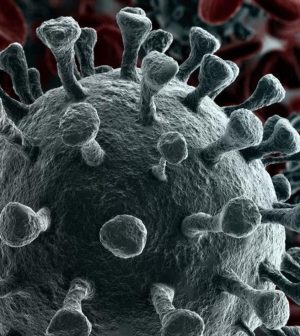- 10 Strategies to Overcome Insomnia
- Could Artificial Sweeteners Be Aging the Brain Faster?
- Techniques for Soothing Your Nervous System
- Does the Water in Your House Smell Funny? Here’s Why
- Can a Daily Dose of Apple Cider Vinegar Actually Aid Weight Loss?
- 6 Health Beverages That Can Actually Spike Your Blood Sugar
- Treatment Options for Social Anxiety Disorder
- Understanding the Connection Between Anxiety and Depression
- How Daily Prunes Can Influence Cholesterol and Inflammation
- When to Take B12 for Better Absorption and Energy
‘Delta Plus’ Variant Surfaces in 8 U.S. States

U.S. health officials say they’re keeping close watch on a ‘Delta plus’ variant that’s been detected in at least eight states.
While the AY.4.2 “sub-lineage” of Delta may spread faster than the original variant, there’s no evidence that it causes more severe illness, and authorities say current vaccines remain effective against it, CBS News reported.
Lab tests have confirmed at least one case of AY.4.2 in each of the following states: California, Florida, Maryland, Massachusetts, Nevada, North Carolina, Rhode Island, Washington, and the District of Columbia.
While the U.S. Centers for Disease Control and Prevention estimates that AY.4.2 has accounted for less than 0.05% of circulating cases in the United States for several weeks, federal officials are tracking it closely.
“We have teams that are constantly reviewing the genetic sequence data and looking for blips, an increase in a certain proportion or just something that’s completely new,” Dr. Summer Galloway, executive secretary of the federal government’s SARS-CoV-2 Interagency Group, told CBS News.
Labs have started to prepare tests to assess whether AY.4.2 can evade antibodies from vaccinated people or from monoclonal antibody treatments, said Galloway, who is also policy lead on the CDC’s laboratory and testing task force.
“Right now, I think there’s not a lot that we know. But in terms of the risk that it poses to public health, the prevalence is very low in the U.S. and we don’t really anticipate that the substitutions [of AY.4.2] are going to have a significant impact on either the effectiveness of our vaccines or its susceptibility to monoclonal antibody treatments,” Galloway added.
AY.4.2 and previously identified sub-lineages of Delta called AY.1 and AY.2 are sometimes interchangeably called ‘Delta plus’ variants. Overall, the Delta variant and its sub-lineages have caused nearly 100% of cases in the United States for months, according to the CDC.
In the U.K., AY.4.2 now accounts for more than 11% of cases of the Delta variant, but officials say it does not appear to have caused a “significant reduction” in vaccine effectiveness or an increase in hospitalizations,CBS News reported.
However, it could be spreading faster due to “slightly increased biological transmissibility,” according to a report from the U.K. Health Security Agency.
More information
Visit the U.S. Centers for Disease Control and Prevention for more on COVID variants.
Source: HealthDay
Copyright © 2026 HealthDay. All rights reserved.










